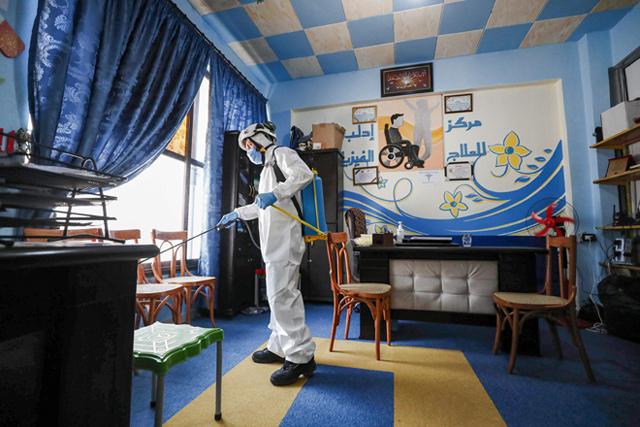- International News
- Sun-2020-07-12 | 03:27 pm

A UN Security Council resolution authorising aid deliveries through the Turkish border expired on Friday as Russia and China vetoed an extension.
The world body's failure to agree on a compromise formula has threatened humanitarian assistance to an estimated 2.8 million people who depend on such handouts.
Germany and Belgium are still working on an initiative to rescue the authorisation in place since 2014, with hopes of bringing it to a vote this weekend.
In a crowded Idlib displacement camp, 45-year-old Nasr said life without aid would plunge into hunger many of those who had already lost their homes in Syria's nine-year war.
"We have abandoned our home, our land and our livelihoods. The aid they give us is all we have," he said from inside his tent near the town of Maaret Misrin.
"If the assistance is scrapped, we will face famine."
'Coronavirus will get us'
The Idlib region, Syria's last major opposition bastion, is home to some 3 million people, nearly half of whom have been displaced from other regions.
Nasr's family fled their hometown in southern Idlib to safer areas near the border with Turkey after a regime offensive that displaced nearly a million people between December and March.
A truce has stemmed the Russia-backed campaign on Idlib, a region dominated by Hayat Tahrir Al Sham (HTS), an extremist group led by Syria's former Al Qaeda affiliate, and their rebel allies.
Apart from food insecurity, Idlib has recorded at least three cases of COVID-19 since Thursday, sparking fears of a health catastrophe if the pandemic hits overcrowded displacement camps.
The confirmed cases are all medical personnel working in hospitals near the Turkish border.
"If medical assistance is not delivered to the camps, then we will be finished" said Nasr. "The coronavirus will get us."
Abed Al Salam Youssef, also displaced, said camp residents will be more vulnerable to the coronavirus if aid is halted, especially since many will have to venture out to seek food and work.
"How can we commit to confinement inside the camps if people can't even secure their basic daily needs without humanitarian assistance?" he asked.
"Most of the displaced rely entirely on monthly food baskets" distributed by aid groups to survive, Youssef added.
'Politicising' aid
Save the Children also condemned the UN's failure so far to renew the authorisation for aid distribution to the displaced without having to pass through Damascus.
"The border crossings were the only meaningful way for vital humanitarian aid ... to reach families in northwest Syria," it said in a statement.
"If the border crossings are not reinstated, many families will not be able to eat, will not receive healthcare, and will not find shelter" said the charity's CEO, Inger Ashing.
European countries and the US want to maintain two crossings on the Turkish border — at Bab Al Salama, which leads to the Aleppo region, and Bab Al Hawa, serving Idlib.
An alternative proposal submitted by Russia would keep only the Bab Al Hawa access point open, for one year.
Moscow says more than 85 per cent of aid has been going through Bab Al Hawa and that Bab Al Salama can be closed.
In January, Moscow succeeded in reducing the crossing points from four to two, and in limiting the extension to six months.
The International Crisis Group accuses Russia of "politicising cross-border aid" to Syria and warns that the policy could backfire.
"Continuing to attempt to make a political point at the expense of the most vulnerable could drive Western states to revert to a pre-2014 modus operandi, bypass multilateral mechanisms and deliver aid directly to northern Syria," said its senior Syria analyst, Dareen Khalifa.
Standing in front of his tent in the Maaret Misrin camp, Abed Al Salam fears for the future.
Millions of Syrians will face "a huge catastrophe in front of the eyes of the world", he said












